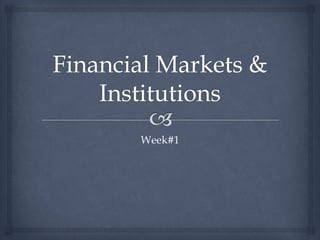
Financial Markets & Institutions
- 1. Week#1
- 2. Throughout the course, students will be equipped with knowledge of financial system and its regulatory system, role of markets, intermediaries and how the entire above are affected when there is a change n monetary or regulatory policy. On completion of the course, the students shall be able to demonstrate an understanding of the subject matter. Course Objectives
- 3. 1-3 © 2012 Pearson Prentice Hall. All rights reserved. Why Study Financial Markets? Financial markets, such as bond and stock markets, are crucial in our economy. 1. These markets channel funds from savers to investors, thereby promoting economic efficiency. 2. Market activity affects personal wealth, the behavior of business firms, and economy as a whole
- 4. Why Study Financial Markets? Well functioning financial markets, such as the bond market, stock market, and foreign exchange market, are key factors in producing high economic growth.
- 5. 1-5 © 2012 Pearson Prentice Hall. All rights reserved. Why Study Financial Markets? Debt Markets & Interest Rates Debt markets, or bond markets, allow governments, corporations, and individuals to borrow to finance activities. In this market, borrowers issue a security, called a bond, that promises the timely payment of interest and principal over some specific time horizon. The interest rate is the cost of borrowing.
- 6. Why Study Financial Markets? Debt Markets & Interest Rates There are many different types of market interest rates, including mortgage rates, car loan rates, credit card rates, etc. The level of these rates are important.
- 7. Why Study Financial Markets? The Stock Market The stock market is the market where common stock (or just stock), representing ownership in a company, are traded. Companies initially sell stock (in the primary market) to raise money. But after that, the stock is traded among investors (secondary market). Of all the active markets, the stock market receives the most attention from the media, probably because it is the place where people get rich (and poor) quickly.
- 8. Why Study Financial Markets? The Foreign Exchange Market The foreign exchange market is where international currencies trade and exchange rates are set. Although most people know little about this market, it has a daily volume around $1 trillion!
- 9. Why Study Financial Institutions? We will also spend considerable time discussing financial institutions—the corporations, organizations, and networks that operate the so- called “marketplaces.” These institutions play a crucial role in improving the efficiency of the economy. We will look at: 1. Central Banks and the Conduct of Monetary Policy The role of the Fed and foreign counterparts 2. Structure of the Financial System Helps get funds from savers to investors
- 10. Why Study Financial Institutions? 3. Banks and Other Financial Institutions Includes the role of insurance companies, mutual funds, pension funds, etc. 4. Financial Innovation Focusing on the improvements in technology and its impact on how financial products are delivered 5. Managing Risk in Financial Institutions Focusing on risk management in the financial institution.
- 11. 1-11 © 2012 Pearson Prentice Hall. All rights reserved. How We Study Financial Markets and Institutions Basic Analytic Framework 1.Simplified approach to demand for assets. 2. Basic supply & demand approach to understanding behavior in financial markets.
- 12. 1-12 © 2012 Pearson Prentice Hall. All rights reserved. How We Study Financial Markets and Institutions Basic Analytic Framework 3. Equilibrium forces & profit seeking behavior 4.Transactions cost & asymmetric information approach to financial structure
- 13. Learning Objectives You should be familiar with and able to explain key elements of financial markets and how they function, including the basic theory of asset demand and determination of asset prices, the role of arbitrage and profit motive in financial markets, the role of information in financial markets, and the causes and consequences of financial crises. 1-13
- 14. Thank You…
